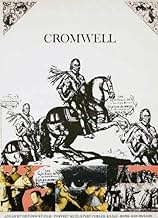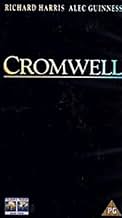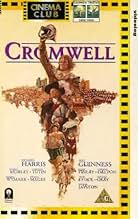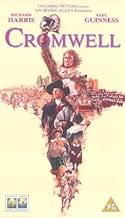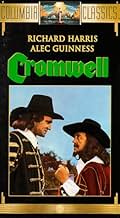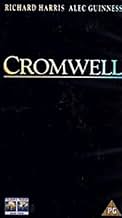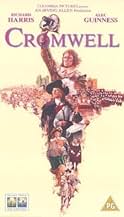Oliver Cromwell ya no puede tolerar las políticas del Rey Carlos y la egoísta clase gobernante y lidera una guerra civil para instaurar al Parlamento como poder supremo en Inglaterra.Oliver Cromwell ya no puede tolerar las políticas del Rey Carlos y la egoísta clase gobernante y lidera una guerra civil para instaurar al Parlamento como poder supremo en Inglaterra.Oliver Cromwell ya no puede tolerar las políticas del Rey Carlos y la egoísta clase gobernante y lidera una guerra civil para instaurar al Parlamento como poder supremo en Inglaterra.
- Ganó 1 premio Óscar
- 2 premios y 5 nominaciones en total
Reseñas destacadas
Such a career deserves a careful movie. CROMWELL is not that film. It does do well in showing King Charles I (Alec Guinness) as a untrustworthy individual (though one driven to such actions because of his need to maintain his rights as monarch). It does make one serious howler regarding Charles I and his trial for treason. Charles may have been a liar and betrayer at times - but Sir Edward Hyde (who was a leading supporter of his, and would be a statesman in his son's reign and the father-in-law of the future James II) did not testify at Charles's trial as a witness for the prosecution.
Such glaring errors are frequent in the movie (for example, Prince Rupert was not dismissed so callously by his uncle King Charles - Rupert was a very fine cavalry leader, and would remain a fixture in English society when Charles II was restored). The subtle acting of Guinness is not matched by Harris, who rants and raves throughout the film - even in the closing moments talking about his intentions to create better schools and laws. Charles and Cromwell are two fascinating characters, and both deserve a better film than this as the sole film about the English Civil Wars (except for Vincent Price's THE CONQUEROR WORM) to come out.
Secondly, yes there is some idea conveyed of the turmoil of the period; the Levellers get a slight, if ridiculously truncated, mention.
However, anyone who knows the slightest snippet about the period must have left the TV screen or whatever nothing but annoyed by the gross licence taken with the events of the civil war. And it is not just the fact that I have studied the period in depth that makes such glaring inaccuracies as:>
Cromwell being named as one of the Five Members, he wasn't.
Cromwell even being present at Edgehill, let alone rescuing the day. Neither are true. At the same time the "arrangement" between the officers of the opposing side which was so crucial to the film never happened; and, at the end of the day the Royalists did not actually win the battle. It was a draw. Okay, I can live with some details being slightly wrong, but the outcome of the entire engagement...?
Why miss out the most bloody, viscious and, many would say, crucial battle of the war? At least at Marston Moor Cromwell was actually there.
Naseby, too, was grossly misrepresented: a) Cromwell did not command the parliamentary forces, Fairfax did; and b) in reality the Royalist force was just over half the size of that of parliament: hardly the stunning victory of a smaller force led by Cromwell as portrayed in the film.
The Civil War was in no way Catholic versus Protestant: both sides were Protestant and, to be technical, both were mostly heartily opposed to Charles' Laudianism (a kind of mixture of the two). However in 1970 some scholarship did maintain this so this mistake can perhaps be understood.
These are just some of the many nitpicking points that seem to preclude the idea that "Cromwell" provides "an excellent history lesson". However, "Appocalypse Now" and "The Thin Red Line" are both examples of historically inaccurate but still highly effective and powerful films. How come "Cromwell" fails on this count? Well, on the one hand neither of these, more recent, films even claim to portray real people -"Cromwell" does and therefore its stubborn disregard of the truth cannot be ignored. Then, on the other hand, if the film attempts to be more than just a reasonably nice looking swashbuckler (which it does) and to really look into the character of its protagonists then surely its case is harmed by these shocking errors. For example, how can the film attempt to portray Cromwell as a man made by his times (rather than the other way around) when it suggests that he was a significant player from the start. Before the outbreak of Civil War Cromwell had made just one vaguely significant speech in parliament. He was never contacted by Pym before the call of Parliament and there was no question of him ever leading the armies of Parliament until the retirement of Fairfax on the eve of the (curiously unmentioned) Second Civil War. Indeed he did not become official leader of the country until 1653. His rise to power was a great surprise to him and his countrymen.
Finally, why miss out Ireland completely from the equation when surely there is no more interesting aspect to the man's character than his opinions on religion?
Cromwell deserves a more accurate cinematic perspective, and surely half of the problem is that this film attempts to cram the ten most monumental years of British history into three hours.
Definately a "could do better".
Alec Guiness's king is impressive and his relationship with the catholic queen should have been more developed .Dame Dorothy Tutin's rendering is subtle and she makes all her scenes count.There is also Robert Morley and Timothy Dalton who give strong support.
Queen Henrietta took refuge in France and her daughter Henriette married the king Louis XIV 's brother ,"Monsieur" .Sadly she was to pass away at a very early age probably of peritonitis(few historians still speak of poisoning).
"Cromwell" ,which I saw when it was released ,has stood the test of time quite well,thanks to all these wonderful actors.In his own way,Cromwell was an incorruptible person ,ahead of his time,who predates Robespierre .The fact that he substituted a dictatorship for another one does not ruin his main revolutionary idea:a king is not infallible, the absolute monarchy means tyranny.A century and a half later ,minister Turgot told Louis XVI :"do not forget Charles the first,Sire!"
Like the many tellings of the story of Mary Tudor and Mary Stuart which have them in climatic meeting, we have Oliver Cromwell and Mary Stuart's grandson, Charles I meeting not once, but several times. They too never met, but the story demands it.
In point of fact Oliver Cromwell was a minor figure in the war between the Crown and Parliament until the Parliamentary Army lost a series of battles and looked like they were going down for the count. It was at that point that Cromwell emerged as a military leader. It turned out that this previously obscure member of Parliament who had no previous military training had a natural genius for warmaking. He turned that army around and eventually Parliament won.
Cromwell could have been George Washington at this point and retired to the farm, but he used his prestige and not as reluctantly as this film shows to make himself the military dictator of Great Britain with the title of Lord Protector.
The experience of Cromwell's reign scarred the English body politic for generations and to a large degree the American one as well. The whole struggle over which interpretation of Christianity would hold sway was something all of the ancestors of the American founding fathers had to deal with. That's when the idea came to them to have no established religion in America. Cromwell's large standing Ironsides Army enforcing his dictatorship led to a positive mania about no standing armies, no quartering of troops and even the right to bear arms. All this because of a collective memory of the Lord Protector.
Richard Harris is a lean and mean Cromwell who keeps saying he just wants to go back to the farm, but somehow winds up grabbing for more power. Alec Guinness is the perfect conception of that luckless monarch Charles I. Please note the relationship between Guinness and Queen Henrietta Marie played by Dorothy Tutin. Two things should be remembered there. First Henrietta Marie is the sister of Louis XIV of France, a monarch with considerable more power than Charles has. Note how Tutin is constantly berating Guinness for not standing up to the Parliament. He does and see where it gets him. Secondly Charles I is one of the very few English monarchs with no royal paramours. He and the Queen were actually in love and he knew her advice was from the heart if it proved disastrous.
Please note a couple of other good performances, Timothy Dalton as Prince Ruppert of the Rhine, Charles's nephew from Germany who actually was a whole lot smarter than he's shown here. And Robert Morley as the Earl of Manchester, one of Cromwell's rivals in the Parliamentary camp.
Oliver Cromwell died in 1558 quite suddenly and within two years the Stuart Monarchy was restored under Charles II, oldest son of Charles I and Henrietta Marie. The collapse of the Protectorate is a subject that English historians have some raging debates over. It was very much like the collapse of the Soviet Union in our time. The collapse of the Protectorate and the Restoration of the Stuarts was filmed in Douglas Fairbanks Jr.'s The Exile and really needs an up to date treatment.
Cromwell as a film is magnificently photographed and directed and actually won an Oscar for costume design. But the flaws in the story line are too many and don't use this film as Cliff's notes kids.
However, putting that to one side, the film version of Cromwell's growing involvement in the War is marginally accurate and well done. Richard Harris, as Cromwell, makes a decent effort although I do feel he makes too much of a theatrical job with the role, with far too much posturing, self-smugness, and above all shouting....
I can understand his unhappiness at the Royalists encroachment of the Common People's liberties; and I can understand him fully remonstrating his feelings in the House of Commons, but Harris seems to shout in nearly every scene. So much so that by the end of the movie he is struggling for breath.
Conversely, Alec Guiness's Charles I is far more intelligently done. Underplayed yet convincing & too some extents we feel more sympathetic to his plight. After all he has a rather scheming Cathloic French Queen, the Catholic Church and a lot of other distractions to occupy his mind and usurp his powers.
The battle scenes are convincing but don't carry the same kind of savagery than the more prosaic Braveheart. But the supporting characters do a good job and add a more rounded feel from Harris' turgid performance.
The directing blows hot & cold, sometimes the story drifts & meanders before pulling back into sharp focus; while the choreography is sweeping & rich in content. The musical score, however, seems tacky & amateurish, lacking any depth in conjunction with what's going on in the film.
However, for all its faults and historical inaccuracies, we do get a slightly better insight into a rather grim & dark chapter in England's turbulent history.
Cromwell is a good film but should be taken with a large pinch of salt as far as retelling history is concerned.
***/*****
¿Sabías que...?
- CuriosidadesWhen writer / director Ken Hughes said to Richard Harris that no self-respecting Irishman should ever play Oliver Cromwell, Harris laughed.
- PifiasCromwell was not one of the Members of Parliament named for arrest in the King's warrant. Cromwell was not present in Parliament at the time the King and his troops entered the House of Commons. The scene of he alluding that The King is a traitor actually happened with John Elliott some ten years prior.
- Citas
King Charles: I do swear that hold this England and its laws dearer to my heart than any here. But gentlemen, if you would reduce me to a figurehead - a puppet king, manipulated by parliament - how then would I serve my country? What manner of king would I be?
Oliver Cromwell: I am persuaded, Your Majesty, that England must move forward to a more enlightened form of government, based upon a true representation of a free people. Such an institution is known as... "democracy", sir.
King Charles: Democracy, Mister...
Oliver Cromwell: Cromwell, sir.
King Charles: Democracy, Mister Cromwell, was a Greek drollery based on the foolish notion that there are extraordinary possibilities in very ordinary people.
Oliver Cromwell: It is the ordinary people, my lord, who would most readily lay down their lives in defense of your realm. It is simply that "being ordinary", they would prefer to be asked - and not told.
- ConexionesFeatured in 52nd Annual Academy Awards (1980)
Selecciones populares
Detalles
- Fecha de lanzamiento
- Países de origen
- Idioma
- Títulos en diferentes países
- Cromwell, hombre de hierro
- Localizaciones del rodaje
- Empresas productoras
- Ver más compañías en los créditos en IMDbPro
Taquilla
- Presupuesto
- 3.750.000 GBP (estimación)
- Duración
- 2h 19min(139 min)



